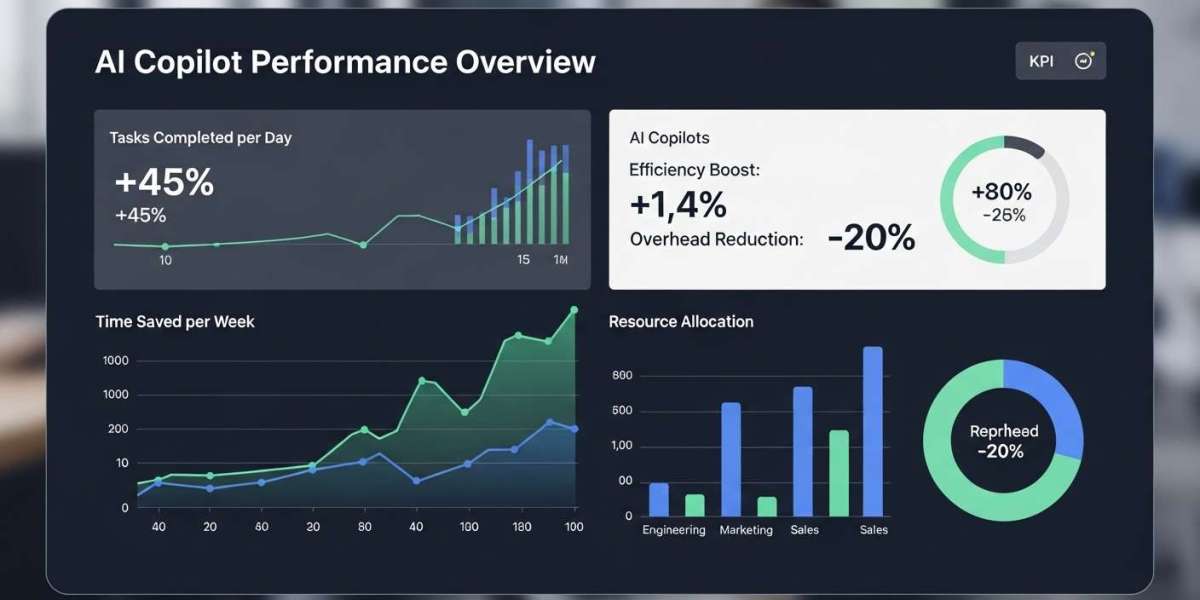Introduction: The Era of Data Overload
In today’s business environment, companies generate an enormous volume of data every day. From customer interactions and sales metrics to market trends and operational reports, organizations are inundated with information. According to research by IDC, the world produces over 175 zettabytes of data annually, and the amount is projected to grow exponentially. While data can be a strategic asset, too much information without proper management leads to analysis paralysis, slower decisions, and missed opportunities.
Teams overwhelmed with raw data struggle to extract actionable insights, often relying on manual reports or incomplete datasets to make critical business decisions. The result is slower response times, inefficient resource allocation, and decisions that may not align with business objectives.
AI copilots offer a powerful solution to this challenge. By integrating with organizational systems and intelligently processing data, AI copilots help teams filter, analyze, and act on information effectively, empowering smarter, faster, and more informed decisions.
Understanding the Data Overload Problem
Data overload occurs when the volume, variety, and velocity of information exceed an organization’s capacity to process it efficiently. Common challenges include:
Excessive raw data: Organizations often store large amounts of unstructured data, making it difficult to identify what is relevant.
Fragmented sources: Data is spread across multiple systems such as CRM, ERP, marketing platforms, and collaboration tools.
Analysis delays: Manual data processing and report generation are time-consuming and prone to errors.
Decision-making bottlenecks: Overwhelmed teams may delay decisions or make choices based on incomplete or inaccurate information.
Loss of opportunities: In fast-moving markets, slow or poor decisions can result in lost revenue or market share.
These challenges highlight the need for solutions that automate data analysis, provide real-time insights, and support evidence-based decision-making.
What Is an AI Copilot Solution?
An AI copilot solution is an intelligent digital assistant designed to help teams manage, interpret, and act on large volumes of data. Unlike traditional business intelligence tools, AI copilots are context-aware and adaptive, providing real-time recommendations, predictive insights, and workflow guidance tailored to the needs of individual users and teams.
Core Capabilities of AI Copilots
Data Aggregation: Consolidates information from multiple sources into a unified view.
Automated Analysis: Processes structured and unstructured data to identify patterns, trends, and anomalies.
Predictive Insights: Uses machine learning algorithms to forecast potential outcomes and risks.
Decision Support: Offers actionable recommendations based on data analysis.
Workflow Integration: Integrates with collaboration, project management, and CRM tools for seamless information flow.
By providing these capabilities, an AI copilot solution enables teams to focus on high-value decision-making instead of spending hours sifting through data.
How AI Copilots Address Data Overload
Streamlining Data Aggregation
One of the main challenges of data overload is fragmentation. Organizations often have valuable information scattered across CRM systems, databases, marketing platforms, and spreadsheets. AI copilots automatically aggregate data from these diverse sources, creating a unified dashboard that provides a comprehensive view of key metrics and trends.
Example: A retail company used an AI copilot solution to consolidate sales, inventory, and customer feedback data. Teams could see all critical information in a single interface, enabling faster and more informed decisions about stock management and promotions.
Automating Analysis and Pattern Recognition
Raw data alone is insufficient for effective decision-making. AI copilots use advanced machine learning algorithms to identify patterns, correlations, and anomalies that humans might overlook. This automated analysis helps organizations detect trends, forecast demand, and optimize operations.
Example: A logistics firm deployed an AI copilot to analyze shipment and delivery data. The system detected patterns in delays related to weather and route congestion, allowing managers to adjust scheduling proactively, reducing late deliveries by 20%.
Providing Predictive Insights
AI copilots go beyond descriptive analysis by offering predictive insights. By leveraging historical data and advanced algorithms, these tools can forecast outcomes, identify risks, and recommend preventive actions.
Example: A financial services company used an AI copilot to analyze client investment behaviors and market trends. The system predicted potential portfolio risks and recommended adjustments, helping advisors make proactive decisions that minimized losses.
Enhancing Decision-Making Speed and Accuracy
Data overload often slows decision-making because teams spend excessive time gathering and interpreting information. AI copilots streamline this process by delivering relevant insights directly to decision-makers, reducing the time required to analyze data manually.
Example: A marketing agency implemented an AI copilot solution to process campaign performance data in real-time. Marketers could quickly adjust strategies based on insights generated by the AI, increasing campaign effectiveness and reducing wasted budget.
Integrating Data Insights into Workflows
AI copilots do more than analyze data; they integrate insights directly into workflows. This ensures that recommendations and alerts are delivered at the right time and in the right context, enabling teams to act efficiently.
Example: In a customer support center, an AI copilot integrated with the CRM to provide agents with recommended responses based on customer history and sentiment analysis. This not only improved response times but also enhanced customer satisfaction.
The Role of an AI Copilot Development Company
Implementing a successful AI copilot solution often requires the expertise of an AI copilot development company. These companies provide end-to-end services, ensuring the solution is customized, integrated, and optimized for the organization’s specific needs.
Key contributions of an AI copilot development company include:
Custom Solution Design: Tailoring AI copilots to specific workflows, data sources, and business objectives.
Integration Services: Ensuring seamless connectivity with existing CRM, ERP, analytics, and collaboration platforms.
AI Copilot Development Services: Offering strategy, development, deployment, and ongoing optimization.
Training and Support: Enabling teams to maximize the benefits of AI copilots and adopt them effectively.
Partnering with a professional AI copilot development company ensures that organizations can leverage data effectively without overwhelming their teams.
Real-World Case Study
Company: A mid-sized e-commerce company was struggling with data overload across sales, inventory, and customer behavior analytics. Manual analysis delayed decision-making and resulted in missed revenue opportunities.
Solution: The company implemented an AI copilot solution with assistance from an AI copilot development company. The AI copilot aggregated data from multiple platforms, provided predictive sales insights, and offered actionable recommendations for inventory and marketing decisions.
Results:
Decision-making speed increased by 40%
Inventory management improved, reducing stockouts by 25%
Marketing campaign ROI increased by 30%
Employees spent significantly less time on manual data analysis
This case demonstrates how AI copilots help organizations turn data overload into actionable insights, empowering smarter decisions and better business outcomes.
Benefits of AI Copilots in Solving Data Overload
Consolidates data from multiple sources into a unified view
Automates analysis and pattern detection to identify actionable insights
Provides predictive recommendations to reduce risk and forecast outcomes
Speeds up decision-making by delivering insights directly within workflows
Reduces cognitive load on teams, allowing employees to focus on high-value tasks
Enhances accuracy and reduces errors caused by manual data processing
Scales with the organization as data volume and complexity increase
By addressing data overload effectively, AI copilots empower teams to make faster, smarter, and more strategic decisions.
Best Practices for Implementing AI Copilots
Identify key data sources and determine areas with the highest information overload
Partner with a reputable AI copilot development company for a customized solution
Integrate AI copilots seamlessly into existing workflows and collaboration platforms
Track KPIs such as decision-making speed, error reduction, and operational efficiency
Continuously refine AI copilot algorithms and recommendations based on user feedback and performance data
These practices ensure that AI copilots deliver maximum value, transforming complex datasets into actionable intelligence.
Frequently Asked Questions (FAQs)
1. What is an AI copilot solution?
An AI copilot solution is an intelligent virtual assistant embedded in workflows that aggregates data, automates analysis, provides predictive insights, and helps teams make smarter decisions.
2. How do AI copilots help with data overload?
AI copilots filter, analyze, and summarize large volumes of data, identify patterns, forecast outcomes, and provide actionable recommendations, enabling teams to focus on high-value decisions.
3. Can AI copilots integrate with existing systems?
Yes. AI copilots can integrate with CRM, ERP, analytics, and collaboration platforms to provide seamless workflow support and deliver insights in real time.
4. What industries benefit most from AI copilots?
AI copilots are valuable in industries with large volumes of data, such as finance, healthcare, e-commerce, marketing, logistics, and technology.
5. Do AI copilots require technical expertise to implement?
Partnering with an AI copilot development company ensures smooth implementation, customization, integration, and ongoing optimization, minimizing the need for in-house technical expertise.
6. Can AI copilots improve decision-making speed?
Yes. By aggregating and analyzing data, AI copilots deliver actionable insights directly to decision-makers, reducing analysis time and enabling faster, more accurate decisions.
7. Are AI copilots scalable?
Yes. AI copilots can adapt to increasing data volume, growing teams, and evolving business needs, making them suitable for organizations of all sizes.
Conclusion
Data overload is one of the most significant challenges modern organizations face, often resulting in slower decisions, operational inefficiencies, and missed opportunities. AI copilots provide a transformative solution by aggregating, analyzing, and delivering actionable insights from vast datasets.
Organizations that leverage an AI copilot solution, with the support of an AI copilot development company and comprehensive AI copilot development services, can turn data chaos into clarity. Teams can make smarter, faster decisions, reduce operational errors, and focus on high-value activities that drive growth.
\



